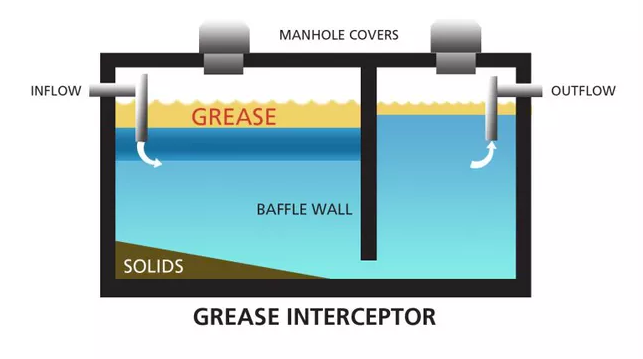
Travel is back in the foreground! Our Property Management team is ready to welcome visitors to our villas. The team is proactive and as experts in the property management arena, we know that more holiday rentals, mean more cooking, and hence, Grease Trap Maintenance needs to be scheduled. So, let’s talk about it!
Importance of a Grease Trap
Grease traps are a requirement for any holiday rental accommodation. A blocked grease trap could fast become an expensive plumbing undertaking; therefore, scheduled grease trap cleaning could save our client’s money. The residual grease from cooking will harden in the pipes, leading to a steady grease buildup, and eventually blocked pipes. You also run the risk of having the sewage system blocked especially when your kitchen is without a grease trap, or more importantly having one that is not maintained often.
How the Grease Trap Works

Importance of Scheduled Cleaning
The installation of a grease trap is only the first step. A preventative maintenance schedule is then set up to ensure routine cleaning is conducted. Depending on the occupancy levels and the frequency of kitchen sink use, emptying and cleaning the grease trap forms part of our regular scheduled property maintenance in order to avoid blockages.
Tips from the PM Team
Scheduled cleaning of grease traps will keep them functioning efficiently. This saves our clients money in the long run by avoiding costly plumbing repairs.
Tip #1: Ensure correct installation
Some grease traps are ready-made out of a fiberglass design while some are actually built on the location of a concrete design. Some companies and contractors are not consistent in their workmanship with the construction of grease traps, and often time design flaws create a lot of issues, which result in having to clean the grease traps too frequently. The cleaning and other services required to clean blocked grease traps could end up creating substantial expenses.
Tip #2: Reduce solid food
Staff and guests alike are reminded to reduce solid material from going into the drain that will end up in the grease trap. While the grease trap is intended to hold the oils, fats and grease, the use of a strainer is your best bet to eliminate the excess solids entering the trap. Remove these solid food items from the dishes before being placing them in the sink. By keeping food out of the grease trap, will maximize the time between cleaning.
Tip #3: The grease trap is not for grease storage
We advise staff not to pour grease directly into the drain but instead store it in the appropriate containers. This helps to avoid the grease trap from reaching its maximum capacity too quickly. This will reduce the likelihood of having to deal with clogged drains.
Tip #4: Schedule Preventative Maintenance
Routine cleaning is essential and it is important to keep a maintenance schedule. Homeowners can get grease traps cleaned on a more infrequent basis by using less grease. It is still important to maintain minimum standards for cleaning times. Even if there’s not much oil, fat, or grease inside the tank, it will still turn rancid and emit a pungent odor. The property managers actually keep a log through a mobile work order app, which comes in handy for reporting to owners and tracking any technical issues.
Stay in touch, we love to hear from you!
Direct Barbados: 1.246.622.4466
Freephone UK: 0800 0885574
Toll Free US/CND: 1 866 404 9600
Email: experts@blueskyluxury.com
Go back to our website
Find a villa here







